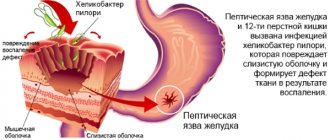Lactofiltrum is a combined action drug that is used to normalize intestinal microflora and strengthen the body. The composition contains sorbene and a prebiotic. The first helps cleanse the body of harmful substances, and the second is responsible for the spread of beneficial bacteria in the body.
How to take Lactofiltrum
The medicine is intended for internal use an hour before meals and other medications. If necessary, the tablet can be crushed. You need to drink enough liquid.
The permissible dose depends on the patient’s age:
- 1-3 years – ½ tablet;
- 3-7 years – 1 tablet;
- 8-12 years – up to 2 tablets;
- From 12 years – up to 3 tablets.
Regardless of age, the medicine should be taken three times a day.
The duration of the treatment course is on average 15-20 days. If you need to extend the course of treatment or repeat it after a while, then before doing so you should definitely consult a specialist. Only he can determine the possibility of further admission.
Tradename
Lacto-G®
International nonproprietary name
No
Dosage form
Capsules
Compound
One capsule contains
active ingredients: Lactobacillus acidophilus
Bifidobacterium longum
Bifidobacterium bifidum
Bifidobacterium infantis
The total number of bacteria is at least 5 x 109 CFU,
excipients: fructooligosaccharides, rice maltodextrin, composition of the capsule shell and cap: polysaccharides.
Description
Hard polysaccharide capsules size No. 0, with a transparent cap and body.
The contents of the capsules are white powder with yellowish inclusions.
Pharmacotherapeutic group
Antidiarrheal drugs. Antidiarrheal microorganisms. Microorganisms that produce lactic acid
Pharmacological properties
Pharmacokinetics
Conducting pharmacokinetic studies of the drug is not possible.
Pharmacodynamics
The lactic acid bacteria included in the drug maintain and restore the physiological balance of the intestinal microflora. Bifidobacteria and lactobacilli, producing lactic and acetic acid, create unfavorable conditions for the reproduction and activity of pathogenic microorganisms; participate in the digestion process and the synthesis of vitamins (B1, B2, B3, B6, B12, H, PP, folic acid, K and E), regulate electrolyte balance, the metabolism of proteins, phospholipids, bile and fatty acids, bilirubin, cholesterol.
Natural polysaccharides - fructooligosaccharides - create good soil for the reproduction, colonization and vital activity of intestinal bacteria - eubiotics. Fructooligosaccharides are not broken down by digestive acids and enter the lower intestine unchanged.
Indications for use
Prevention and treatment of pathological conditions accompanied by:
— dysbacteriosis, including those that occur during treatment with antibiotics
and other chemotherapeutic agents, in children and adults;
- diarrhea, flatulence, constipation.
Directions for use and doses
Children under 2 years of age are prescribed 1 capsule per day before meals. Dilute the contents of the capsule with a small amount of liquid (juice, sugared water).
Children 2-12 years old are prescribed 1-2 capsules per day before meals, with a small amount of liquid. If the child is unable to swallow the capsule, proceed as in the case of children under 2 years of age.
Adults and children over 12 years of age are prescribed 2-3 capsules per day before meals, with a small amount of liquid.
The duration of treatment depends on the cause of the development of dysbiosis and the individual characteristics of the organism. The course of treatment usually lasts 2-4 weeks.
Side effects
The drug is well tolerated; no side effects were noted when used in recommended doses.
- allergic reactions are possible
Contraindications
- hypersensitivity to the components of the drug
Drug interactions
There were no undesirable interactions between Lacto-G and other drugs. Compatible with antibiotics and other chemotherapy drugs.
special instructions
During the period of use of the drug, alcohol consumption is not recommended.
Pregnancy and lactation
If necessary, the use of the drug Lacto-G during pregnancy and lactation is possible according to indications.
Features of the effect of the drug on the ability to drive a vehicle or potentially dangerous mechanisms
There are no special instructions.
Overdose
Overdose symptoms are not described.
Release form and packaging
10 capsules each in a blister pack made of polyvinyl chloride film and printed varnished aluminum foil.
1 contour package along with instructions for medical use in the state and Russian languages is placed in a cardboard pack.
Storage conditions
Store in a dry place, at a temperature of 10 - 25°C.
Keep out of the reach of children!
Shelf life
2 years
The drug should not be used after the expiration date.
Attention! The description of the drug on this page is simplified. Before purchasing and using the drug, consult your doctor or pharmacist, and also read the instructions approved by the manufacturer. Information about the drug is provided for informational purposes only and should not be used as a guide to self-medication. ATTENTION! This section is provided for informational purposes only and is not a catalog or price list of our company. To obtain information about the availability of drugs, call + 99871 202 0999 Pharmacy Network Helpline 999.
Contraindications and adverse reactions
The drug should not be taken if:
- intestinal obstruction;
- increased susceptibility to constituent substances;
- hemorrhage in the gastrointestinal tract;
- galactosemia.
It should be taken with great caution in case of intestinal atony and exacerbation of stomach ulcers. The effect of the drug on the condition of a pregnant woman and her unborn child has not been fully studied.
After administration, negative reactions may occur:
- accumulation of gases in the stomach;
- stomach upset;
- allergy.
Improper use of the drug can lead to an overdose, which is manifested by pain in the abdomen or constipation. If you experience such symptoms, you should stop taking it immediately.
How to take Lactofiltrum for weight loss
Taking the drug helps a little to cope with excess weight. You shouldn’t expect miraculous results, but a couple of extra pounds will definitely disappear. The weight lost will be nothing more than harmful substances accumulated in the body, which will be eliminated from the body as a result of the effects of the medicine.
The fat deposits will remain in place; the product will not have any effect on them. If taking the drug is supported by proper and healthy nutrition, as well as an active lifestyle, then this problem can be successfully dealt with. But you should not overdo it with physical activity; the amount should be kept to a minimum, otherwise there is a possibility of discomfort in the intestines.
Using the product allows you to normalize stool and improve the functioning of the stomach. All this together has a positive effect on the state of the intestinal microflora. If the main purpose of use is to lose weight, then the course of administration is as follows: for 14 days, take 3 tablets three times a day. If a person suffers from diabetes mellitus and experiences frequent constipation, then the use of the product should be discontinued.
PlaniJens® lacto
If any of the diseases/conditions or risk factors listed below are present, the expected benefit versus the possible risk of using PlaniGens® Lacto should be assessed.
Breast cancer The risk of breast cancer (BC) increases with age. Compared to the lifetime risk of breast cancer, the increase in risk associated with COC use is small. The increased risk of developing breast cancer in women using COCs may be due to both earlier diagnosis and the biological effect of COCs, and a combination of these two factors. This increased risk gradually disappears over 10 years after stopping COC use. It is not related to the duration of their use, but depends on the woman’s age during the period of using COCs. Women who take COCs are diagnosed with earlier clinical stages of breast cancer than women who have never taken them. The risk of breast cancer in women using progestogen-only oral contraceptives, such as desogestrel, is probably similar to that of using COCs. However, the data for progestogen-only oral contraceptives are less clear. Since it is impossible to exclude the biological effect of gestagens on the development of liver cancer, an individual assessment of the benefit-risk ratio should be carried out when prescribing the drug to women with liver cancer. In case of acute or chronic liver dysfunction, a woman should contact a specialist for examination and consultation. If persistent arterial hypertension develops while taking desogestrel or if antihypertensive therapy is ineffective and there is a clinically significant increase in blood pressure, the possibility of discontinuing the use of PlaniGens® lacto should be considered.
Thromboembolic disorders Venous thromboembolism Epidemiological studies have established an association between the use of COCs and an increased incidence of VTE (DVT and PE). Although the clinical significance of these data for desogestrel as a contraceptive that does not contain an estrogen component is unknown, taking PlaniGens® Lacto should be discontinued if thrombosis develops.
Prolonged immobilization associated with surgery or illness Discontinuation of desogestrel should be considered in the event of prolonged immobilization associated with surgery, injury or illness.
Diabetes mellitus Although gestagens can affect peripheral insulin resistance and glucose tolerance, adjustment of the dosage regimen of hypoglycemic drugs in patients with diabetes mellitus using gestagen-containing oral contraceptives is usually not required. However, such women should be under close medical supervision during the first months of taking PlaniGens Lacto.
Bone mineral density (BMD) The use of desogestrel leads to a decrease in the concentration of estradiol in the blood plasma to a level corresponding to the early follicular phase. It is currently unknown whether this decrease has any clinically significant effect on BMD.
Prevention of ectopic pregnancy Prevention of ectopic (ectopic) pregnancy with traditional gestagen-containing oral contraceptives (“mini-pills”) is not as effective as when taking COCs, since ovulation often occurs with their use. Although desogestrel effectively suppresses ovulation, in the case of amenorrhea or abdominal pain, ectopic pregnancy should be excluded.
Chloasma, especially in women with a history of chloasma during a previous pregnancy Women with a predisposition to chloasma should avoid exposure to sunlight or ultraviolet radiation while taking desogestrel. The following conditions have been observed during pregnancy and the use of sex hormones, although their relationship with the use of gestagens has not yet been established: jaundice and/or itching of the skin associated with cholestasis; cholelithiasis; porphyria; systemic lupus erythematosus; hemolytic-uremic syndrome; chorea; herpes during pregnancy; hearing loss associated with otosclerosis; hereditary angioedema.
Medical examinations/consultations Before prescribing the drug, the woman’s general and gynecological history should be carefully collected, and a clinical and laboratory examination should be performed to exclude pregnancy. If there is a history of menstrual irregularities, for example, oligomenorrhea and amenorrhea, the cause of their occurrence should be determined. The interval between control medical examinations is determined by the doctor in each individual case (but not less than once a year). If taking desogestrel may affect a latent or existing disease, an appropriate schedule of follow-up medical examinations should be established. If you become pregnant, you should stop taking PlaniGens® Lacto. Women should be informed that PlaniGens® Lacto does not protect against HIV infection (AIDS) or other sexually transmitted diseases.
Reduced effectiveness The effectiveness of progestin-containing oral contraceptives may be reduced in case of missed pills, gastrointestinal upset, or when taking other medications together.
Changes in the nature of menstruation While taking gestagen-containing contraceptives, in some women, bleeding from the genital tract may become more frequent or longer lasting, or less frequent or stop altogether. These changes are often the reason that a woman refuses this method of contraception or ceases to strictly follow the doctor's instructions. In detailed consultation with women who decide to use desogestrel as a method of contraception, the doctor should discuss the possibility of such changes in the nature of the menstrual cycle. Evaluation of bleeding should be based on clinical findings and may include evaluation to rule out malignancy or pregnancy.
Development of follicles When taking all low-dose hormonal contraceptives, follicle development occurs; occasionally, the size of the follicle can reach sizes exceeding those in a normal cycle. This is often asymptomatic, and in some cases there may be mild pain in the lower abdomen. Typically, these enlarged follicles regress spontaneously. Surgery is rarely required.
Laboratory tests The use of COCs may affect the results of some laboratory tests, including biochemical indicators of liver, thyroid, adrenal and kidney function, concentrations of (transport) proteins in the blood plasma, for example, SHBG, lipid/lipoprotein fractions, indicators of carbohydrate metabolism , blood clotting and fibrinolysis. Usually these changes remain within normal limits. It is unknown to what extent this also applies to progestogen-only contraceptives.
How to take Lactofiltrum for acne
The medicine has an enterosorbing and binding effect. This is not directly related to acne treatment. But if the cause of acne is problems with the intestines, the product can have a positive effect on the condition of the skin by removing harmful and toxic substances from the body. This will help to achieve a significant reduction in skin rashes.
It is worth saying that this is not the only effect of taking it, but only an additional one. The drug can be safely included as part of a complex treatment. If the appearance of rashes is associated with changes in hormonal levels, then there will be no result from using Lactofiltrum. Even if acne is caused by intestinal dysfunction, you should not rely only on this drug. The effect can only be achieved when taken with other medications and skin care products.






